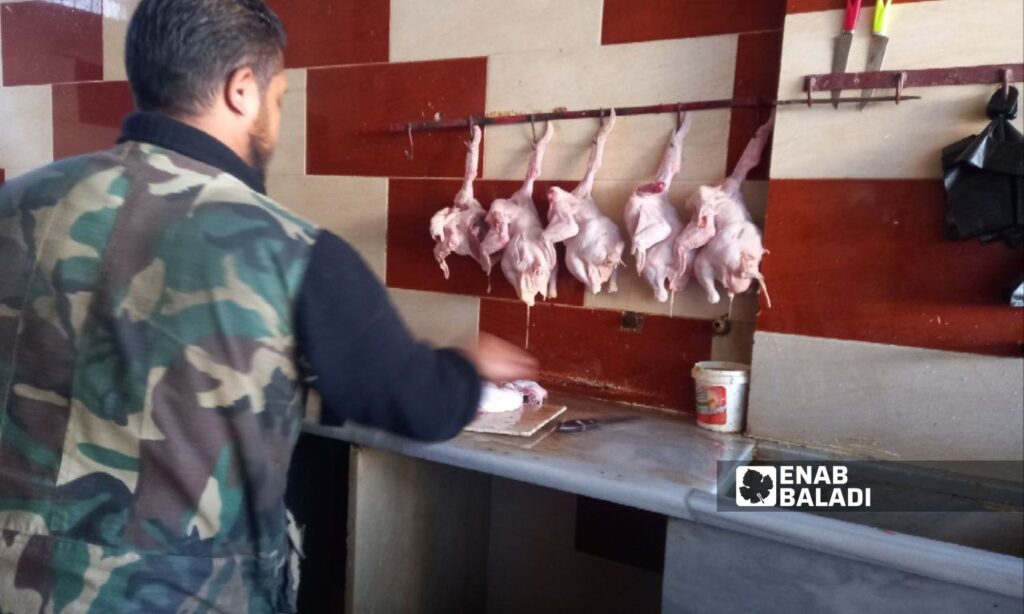Daraa – Halim Muhammad
The local market in Daraa, southern Syria, has witnessed a decrease in chicken meat prices by about 25%.
The price drop followed the production of new batches, fears of broiler death due to high temperatures, and the entry of smuggled chicks from Turkey into areas controlled by the Syrian regime.
The price per kilogram of broiler before slaughter reached 32,000 Syrian pounds (USD 2.17), down from 45,000 pounds at the beginning of last August.
The price per kilogram of thighs was 35,000 pounds, down from 48,000, and the price per kilogram of breast was 50,000 pounds, down from 65,000 pounds.
The price drop led to increased demand for chicken meat among residents, and chicken meat stores and slaughterhouses also witnessed a revival after a period of stagnation and weak sales.
Three reasons
Zakaria al-Za’im, owner of a chicken farm in eastern Daraa countryside, said that the high chicken meat prices in recent months drove breeders back to raising broiler chickens, producing larger quantities of chicken meat in the market.
He added that quantities of Turkish broiler chicks entered through “smuggling” from the northern regions of Syria, contributing to the increase in chicken meat supply.
Mohammad, another chicken farm owner, considered that the Turkish chicks affected the local market and predicted financial losses for breeders and even the collapse of the chicken breeding sector if the entry of Turkish chicks continued.
Mohammad said that the local broiler chicken is of better quality than Turkish because it relies on plant-based feed, while Turkish chickens rely on animal feed.
Member of the Poultry Breeders Committee, Mazen Mardini, expressed concerns that Turkish chicken could transmit diseases to local chickens, threatening the breeding sector in Syria.
Mardini told the local Al-Watan newspaper that the smuggled batches from Turkey to Syria are not subject to health monitoring, their production is weak, and they consume more feed.
He added that he supports the import of broiler chicks but conditioned that they are subject to health monitoring and in calculated quantities.
For his part, “Abu Qasim” (55 years old), owner of a slaughterhouse in the town of al-Muzayrib, attributed the price decline to fears of chicken death due to high temperatures, which prompted breeders to release large quantities of chickens into the local market.
He mentioned that most of the available chickens weigh less than two kilograms, adding that slaughterhouses offered promotions for selling four chickens for 100,000 Syrian pounds (USD 6.8).
When some customers reviewed these slaughterhouses, they found that the chicken’s weight did not exceed 600 grams.
The decrease in chicken meat prices led to increased purchases from slaughterhouses and chicken piece stores.
Despite the decrease, the price is still high compared to the economic and living conditions, as a worker gets 6,000 Syrian pounds per hour in agricultural work (5 hours for 30,000 pounds), while the minimum government salary is 279,000 Syrian pounds.
Residents rely on chicken meat as an alternative to red meat and fish. The price per kilogram of lamb meat has reached 150,000 Syrian pounds (USD 10), beef meat 140,000 pounds, and fish 50,000 Syrian pounds.

